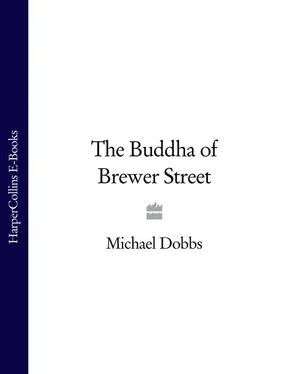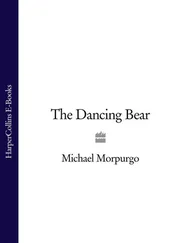He edged his way around the mass of people to the point where he was passing directly beneath the Second Earl of Cholmondeley (or at least his portrait) when his way was abruptly barred by a man clad in a wine-red shawl, right arm bare to the shoulder and holding his hands together and upright in the traditional Buddhist form of greeting.
It was the Dalai Lama.
Suddenly the room no longer seemed so crowded, so claustrophobic. Others had drawn back a pace, leaving Goodfellowe to effect his own introduction. ‘Thomas Goodfellowe,’ the politician offered.
The Lama laughed, a resonant noise like drums being beaten deep within his breast, and behind his glasses the eyes puckered in humour. ‘Of course you are. Goodfellowe. Goodfellowe!’ The name seemed to cause him considerable mirth and he swiped at the name like a benevolent cat might play with a mouse. The Dalai Lama, exiled leader of the distant Buddhist kingdom of Tibet, advanced and took both of the Minister’s hands eagerly in his own, as if he were greeting a long-lost friend. He continued to chuckle and smile, nodding a head that was scraped almost hairless in monastic style. ‘I am very pleased to meet you, Thomas Goodfellowe.’ The mouth and ears were small, the brown skin weathered by exposure to elements and adversity, the glasses prominent; all the features led Goodfellowe’s attention to the Lama’s eyes, which sparkled and danced, like small crescents of the moon. Some aspect of those eyes, some attribute hidden deep away, seemed somehow familiar, like an elusive memory.
‘I am a considerable admirer of your country,’ Goodfellowe offered, since the Lama showed no indication of wanting to lead the conversation. ‘At home I have a beautiful bronze Buddha’s head.’ He’d picked it up on impulse one Saturday morning a few years ago, from Ormonde’s in the Portobello Road, a piece whose serenity had captivated him. ‘Sadly, I suspect, torn from one of your temples.’
‘Everything of value has been torn from our temples, Thomas Goodfellowe.’
‘I am sorry,’ Goodfellowe offered, taking the Lama’s comment as a rebuke.
But the deep bass drums within the Lama’s chest began to resound with laughter once again. ‘Better you have it and appreciate it, than it lie unnoticed beneath the boots of the Chinese Army. Indeed, perhaps that is the true task of the People’s Liberation Army. To make sure that the message and beauty of Tibetan Buddhism will be spread throughout the world.’ His arm waved expansively. ‘Like bees spreading pollen.’
‘I suppose so,’ Goodfellowe responded cautiously, finding the analogy uncomfortable.
The Lama laid a hand upon Goodfellowe’s shoulder. The gesture brought them still closer together but Goodfellowe felt none of the typical English diffidence at the unexpected intimacy; somehow it felt entirely natural. ‘At last our paths cross. In this life,’ the Lama offered.
At least, that’s what Goodfellowe thought he heard him say. Our paths cross. In this life. With the punctuation between the two thoughts definitive and deliberate. As though their paths might have crossed before.
‘“In this life”?’ Goodfellowe enquired.
‘We Buddhists believe in many lives.’ The voice was remarkably resonant; it seemed to spend an exceptionally long time travelling through the passages of the skull, giving it an unusual and deep timbre.
‘And you believe … we may have met before?’ Goodfellowe asked incredulously. ‘In a previous life?’
‘Who is to know?’ the Lama responded. ‘But the past is no more than a signpost on our way. It is the future that must concern us, Thomas Goodfellowe. You will be important to our future, I think.’
‘Me?’
Someone was at the Lama’s elbow now, trying to guide him on.
‘I wish you well tomorrow, Thomas Goodfellowe.’
‘Tomorrow?’ Goodfellowe was perplexed. How could the Lama know? But surely it was just another ambiguous turn of phrase. Like a fairground fortune teller.
‘And for all your days thereafter. We shall meet again.’
He was turning to leave but Goodfellowe placed a restraining hand on his arm, puzzled by the ambiguities, angered by the almost casual manner in which the Lama pretended to know more, much more, than he obviously could. Or should.
‘When? When shall we meet?’
The Lama took both of his hands once more and stared directly into his eyes. The wrinkles of amusement were gone.
‘Perhaps only after many troubles, Thomas Goodfellowe, my friend. But I want you to remember two things. That whatever it is you do, it is your motivation that matters above all else. Many may misunderstand you, but it matters not, so long as you understand yourself.’
The words struck him like a slap across the face. Understand himself? How could he? Goodfellowe was lost on the great ocean of life. His son drowned. Sails torn. His compass gone. The only thing he understood was that he couldn’t take much more of it. He felt angry again, as though the Lama had penetrated his soul and ransacked his emotions. The guest of honour was turning to leave.
‘What is the second thing?’ Goodfellowe shouted after him.
The Lama half turned. ‘That the future has a Chinese face.’ Then in a sweep of colourful robe he was gone.
Suddenly Goodfellowe felt flushed, bemused. What on earth did this strange-sounding Lama mean? What future? And why a Chinese face? It sounded surprisingly defeatist, coming from a man who had spent a lifetime trying to ensure that the only part of the Chinese anatomy his countrymen saw was the back. Above him George, the second Earl of Cholmondeley, stared down. Three hundred years earlier the good earl had been a groom to the bedchamber, Member of Parliament, lord-lieutenant of half a dozen counties and an excellent marshal who had rallied troops to the cause of four monarchs. That’s what the Dalai Lama was doing, Goodfellowe decided: trying to recruit him for the cause. He’d probably get a letter in a couple of days asking for a donation, or perhaps a subscription to some Himalayan hill-walking society. Well, tough. Money was tight and charity ran out at the door of Elinor’s nursing home.
As he was leaving, for the first time he noticed that he was holding a string of prayer beads, small circular pieces of old sandalwood threaded on silk. The Lama had left them with him; he hadn’t noticed.
That night, Goodfellowe dreamed, more vividly than he had ever dreamed before. He was sitting on a rock at the mouth of a cave. Alone. In the distance he could see mountains more vast than any he had ever known, great slabs of grey-green rock and shadows of deepest purple, leaping up from the land and stretching for the sky. A sky the colour of polished lapis. Before the mountains lay a great plain, filled with snow so intensely white that it must have been many feet thick and perhaps many centuries old. From somewhere nearby, but unseen, came the rushing of meltwater. Then the meltwater came into view, spreading like a stain across the snow. A deep red stain. Like the flowing of a lama’s robe.
The colour of flowing blood.
Goodfellowe woke with sweat trickling down his chest. No matter how hard he tried, he couldn’t get back to sleep that night. And, after he had put in his letter of resignation to the Prime Minister, not for many nights to come.
‘Madame Lin!’ Goodfellowe exclaimed, almost as if in surprise. ‘What a pleasure. Please – come in.’
The expression on the face of the veteran Chinese diplomat made it evident that this was not one of those pleasures to be shared. Hers was an elegant face, not round and androgynous in the manner of many ageing Chinese but with high cheekbones and full lips that, when they smiled, were still very feminine. This morning, however, they were not smiling. The bun that held back the fine silver sixty-something hair seemed to have been tightened an extra turn and the dark-spice eyes, which so often glowed with humour, were narrowed and deliberately inscrutable. Her hand barely brushed the Minister’s palm in greeting.
Читать дальше












